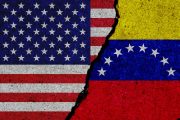
President Donald Trump announced his intention to negotiate an agreement with Ukraine, offering continued military assistance in the war against Russia in exchange for access to the country’s rare earth elements. This proposal signifies a strategic shift in U.S. foreign policy, linking support to tangible economic interests.
The Proposal
Talking to the reporters from the Oval Office on Monday, Trump explained,
We’re telling Ukraine — they have very valuable rare earth. We want what we put up to go in terms of a guarantee. We want a guarantee. We’re handing them money hand over fist. We’re giving them equipment…. We’re looking to do a deal with Ukraine, where they’re going to secure what we’re giving them with their rare earth and other things.
While unspecified, Trump’s reference to “other things” likely alludes to rare minerals such as lithium and titanium. These are used in industries ranging from defense and aerospace to energy storage and high-tech manufacturing.
Asked to clarify if he “wants [Ukraine] to give rare earths to the United States,” Trump said, “Yeah. I want to have security of rare earth.” He also indicated that Ukraine is “willing to do it.”
Ukraine has notable deposits of certain rare earth elements (REEs), including beryllium and niobium. According to the Green European Journal, the deposits “have the potential to make Ukraine a superpower in the energy transition.”
Ukraine’s Mineral Wealth
Ukraine is one of the key players in the global supply of critical raw materials. One of the global players understanding this potential is the World Economic Forum (WEF). In June, the group underscored the importance of Ukraine’s mineral reserves in global supply chains, and its significance in the push for decarbonization.
Ukraine is home to approximately 20,000 mineral deposits spanning 116 different types of minerals. Of the 50 strategic minerals identified by the United States as critical to its economy and national security, Ukraine supplies 22.
Among its most valuable resources are titanium, lithium, beryllium, manganese, gallium, uranium, zirconium, graphite, apatite, fluorite, and nickel. Notably, Ukraine possesses the largest titanium reserves in Europe, representing seven percent of global reserves. It also holds nearly 500,000 tons of lithium. This is a strategic resource essential for meeting the growing global demand for battery production.
Estimates of Ukraine’s mineral wealth total value varying among sources. According to a 2022 report by The Washington Post, Ukraine’s reserves of titanium, iron ore, lithium, and other minerals are collectively worth “tens of trillions of dollars.” Similarly, a 2022 article from the Middle East Institute cites estimates ranging from $3 trillion to $11.5 trillion for Ukraine’s rare earth metals and lithium reserves.
Gold Mine Under Rubble
Ukraine’s vast reserves of REEs and critical minerals have made it a highly sought-after resource hub for Western nations. With global demand for these minerals surging — particularly for energy, defense, and high-tech industries — the United States and EU seem to be viewing Ukraine less as a “bastion of democracy” and more as a treasure trove of raw materials.
One of the loudest voices advocating for Western support to Ukraine is neoconservative Senator Lindsey Graham (R-S.C.). While “championing democracy,” he appears equally captivated by the country’s mineral wealth. In a June interview with CBS, he bluntly framed the war in economic terms, stating, “[Ukrainians] are sitting on a gold mine.”
Graham further emphasized:
This is a very big deal, how Ukraine ends. Let’s help them win a war we can’t afford to lose…. To give Putin $10 or $12 trillion of critical minerals that he will share with China is ridiculous.
For all of Ukraine’s geological riches, the country lacks the technological infrastructure, expertise, and financial capacity to mine and refine these resources independently. Even before the war started, Ukraine managed to actively exploit only 15 percent of its deposits. The war has crippled its ability to exploit these assets even further. At the same time, many key deposits are located in Russian-occupied territories or near active conflict zones. As a result, Ukraine finds itself entirely dependent on Western “allies” — not just for military aid, but for mining investment, advanced processing capabilities, and security protection. Perhaps the West’s enthusiasm for Ukraine’s sovereignty is less about “protecting democracy” than it is about securing strategic minerals.
Ukraine’s “Victory” Plan
Ukrainian President Volodymyr Zelensky has already thrown open the doors to Ukraine’s rich mineral bounty for the West.
In a “Victory Plan” posted last October, Zelensky rolled out a “special agreement” with strategic partners, granting them “joint protection, investment, and use” to the country’s natural resources and rare minerals. While framed as a matter of security and mutual benefit, the proposal unmistakably ties continued Western support to the shared exploitation of Ukraine’s mineral wealth.
As Zelensky put it, “The deposits of critical resources in Ukraine … are among the key predatory objectives of the Russian Federation in this war. And this is our opportunity for growth.”
Intriguingly, the plan also includes a classified annex, accessible only to “designated partners.”
The EU
Trump’s proposal to secure U.S. access to Ukraine’s resources could put him at odds with the EU, which already has its own agreement in place for Ukrainian rare earths. Signed in 2021, their strategic partnership aims to develop joint exploration, extraction, and processing of REEs and critical minerals. It also seeks to reduce the EU’s reliance on China and Russia. With both Washington and Brussels eyeing the same prize, Trump’s move risks undermining European interests, potentially fueling tensions over who gets priority in Ukraine’s post-war resource economy.
Russia’s Response
The Kremlin swiftly condemned President Trump’s proposal, branding it as an attempt to “buy help” rather than provide assistance based on strategic or humanitarian grounds.
Kremlin spokesperson Dmitry Peskov told reporters on Tuesday, “If we call things as they are, this is a proposal to buy help — in other words, not to give it unconditionally, or for some other reasons, but specifically to provide it on a commercial basis.”
Peskov added, “It would be better, of course, for the assistance to not be provided at all, as that would contribute to the end of this conflict.”
Beyond diplomatic rhetoric, Russia has a vested interest in Ukraine’s mineral wealth. Some of Ukraine’s most valuable deposits are located in or near Russian-occupied territories such as Donetsk and Luhansk. If Kyiv were to strike a resource deal with Washington, it could solidify Ukraine’s economic future, further diminishing Russian leverage.
Constitution vs Realpolitik
On the campaign trail, Trump promised to end the war in Ukraine “within 24 hours,” extending the deadline to 100 days once in office. Yet his latest proposition — offering continued U.S. support in exchange for Ukraine’s mineral riches — suggests he does not see the conflict reaching a conclusion any time soon. More critically, it confirms that the United States will remain financially and materially entangled in a foreign war, despite the clear lack of constitutional grounds for such support.
The question now is whether securing critical minerals justifies the continued flow of U.S. resources into the conflict. Is access to Ukraine’s rare earths truly worth sidelining constitutional constraints, or has the logic of realpolitik fully overtaken the principles of American governance?





